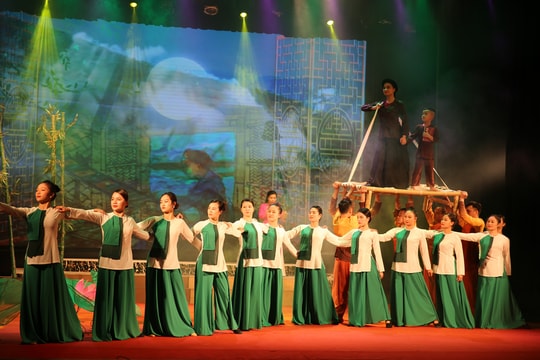Nghe An language for Nghe An people far from home
(Baonghean.vn) - In the heart of every Nghe An person far from home, there seems to be a deep longing for their homeland with many old stories. And when a Nghe An person far from home meets a fellow countryman, they immediately change their tone of voice to "Where are you from?" and all the distances of formality are miraculously shortened.

The road to Nghe An is winding (photo taken at Cam Bridge). Documentary photo
I still remember the following story: One evening in the winter of 1981, I was walking near Dai Co Viet Street on the road now called Ta Quang Buu Street, when I heard a group of Polytechnic students ahead talking to each other about their Nghe Tinh friends. What I heard was: “I admit that the Nghe Tinh friends are really close friends. It’s funny, these people, they were speaking Northern dialect to us normally, but when someone with a Nghe accent appeared next to them, they immediately changed their accent, it was unbelievable. It was like a foreign language.” The story I heard on the street more than 40 years ago has remained in my memory forever, somehow making me more proud of the closeness of my Nghe people when they were far from home, of the Nghe accent when people from other regions first heard it, as if it were a foreign language.
After that, I taught Vietnamese in Cambodia from 1982 to 1990. I remember in 1983, I met and became friends with a group of Vietnamese volunteer soldiers who were on duty to protect the Forward Command area of the Vietnamese Volunteer Army. I was a bit surprised because they were all Nghe An soldiers. During a beer party, I learned that there were about 200 Nghe An soldiers on duty here. One of the boys in this group, named Thuan, was from Vinh An village, Thanh Tuong commune, Thanh Chuong district, my hometown, and often came to visit me. He said that there was another person from Thanh Linh who lived 15 kilometers away from me. One weekend, suddenly a boy from Thanh Linh came to my house and said: I am Van from Thanh Linh. I heard from Thuan that there is a man named Nam from Thanh Van who teaches at the University of Medicine and Pharmacy in Phnom Penh. I wanted to come up and visit you. I thought I could borrow their bike, but it broke down, so I walked up here!
I was touched by the young 20-year-old soldier who walked 15 kilometers one morning to visit a fellow countryman whose name he had only heard but had never met. Van stayed with me all day. After that, we occasionally met up with 3-4 other soldiers from Thanh Chuong like Thuan, Khanh... I remember, during Tet, Van was on leave so he brought letters and gifts from me to my mother and sister in the countryside, ate at my house, and when he came back, he brought honey cakes my mother made for me. The memory of a soldier from the same hometown walking 15 kilometers to find a fellow countryman like me on a weekend in the dry season of 1984 still haunts me about the love of the homeland/love of the people of Nghe An.
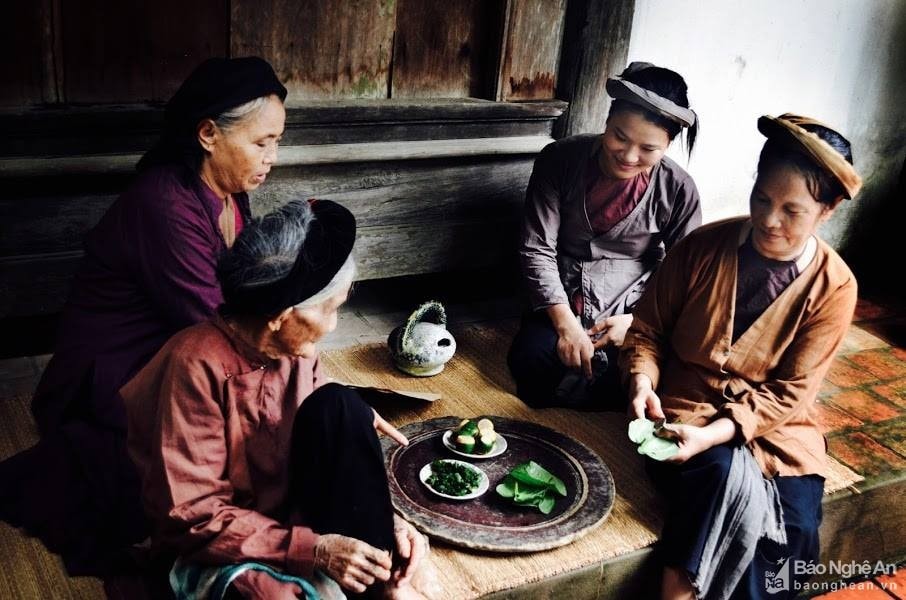
Nghe dialect is one of the regions belonging to the Central dialect. Over a tray of betel and a pot of green tea, the lively stories on the porch of the ladies' houses are imbued with the soul and love of the countryside. Photo: Cao Dong
In 2017, I went to work at Paris Diderot University (France). A Vietnamese teacher in the Vietnamese community named Gai Joé Nguyen, whose Vietnamese name is Gái, was my student in the Vietnamese Teaching Methods for Overseas Vietnamese Teachers class, jointly organized by the Ministry of Foreign Affairs and the Ministry of Education in Hanoi every August, took me on a tour of Paris.
Knowing that I was from Thanh Chuong, she called a close friend who had studied with her in the French department, University of Foreign Languages - University of Da Nang, married a Belgian and was living in Longwy, Northeast France. Her close friend's name was Nhan, from my hometown Thanh Chuong. The girl called and said that there was a teacher named Nam from Thanh Chuong who was here, at that time we were standing on a bridge near the Eiffel Tower and passed the phone to me to talk to Nhan. On the other end of the line was a thick Thanh Chuong accent, I also changed my Thanh Chuong accent...
After talking for a while, Nhan invited me to go to Nhan's family's place in Longwy to visit. I said that in a few days, when my wife came over, if possible, my husband and I would go together. I said that, but in my mind I thought it was impossible to go, because the distance to where Nhan lived was very far. But by chance, luck came to me when my cousin's brother-in-law, my cousin's husband, was working as an Ambassador in Belgium-Luxembourg and my cousin knew through Facebook that I was working in France so she texted me and invited me to come to Belgium to visit.
After consulting with the Girl, she proposed the following plan: On the weekend, she and her mother would go with us to Nhan's house in a neighborhood at the border intersection of three countries: France, Luxembourg, and Belgium. We would stay there from yesterday afternoon for a night, then the next morning we would visit the area around Nhan's house, the next afternoon we would go to Luxembourg for about 3 hours, then say goodbye at the Luxembourg train station, and my husband and I would go to Belgium. That way we could visit Nhan's house and learn about another country, Luxembourg. And so we had a wonderful trip down to Longwy.
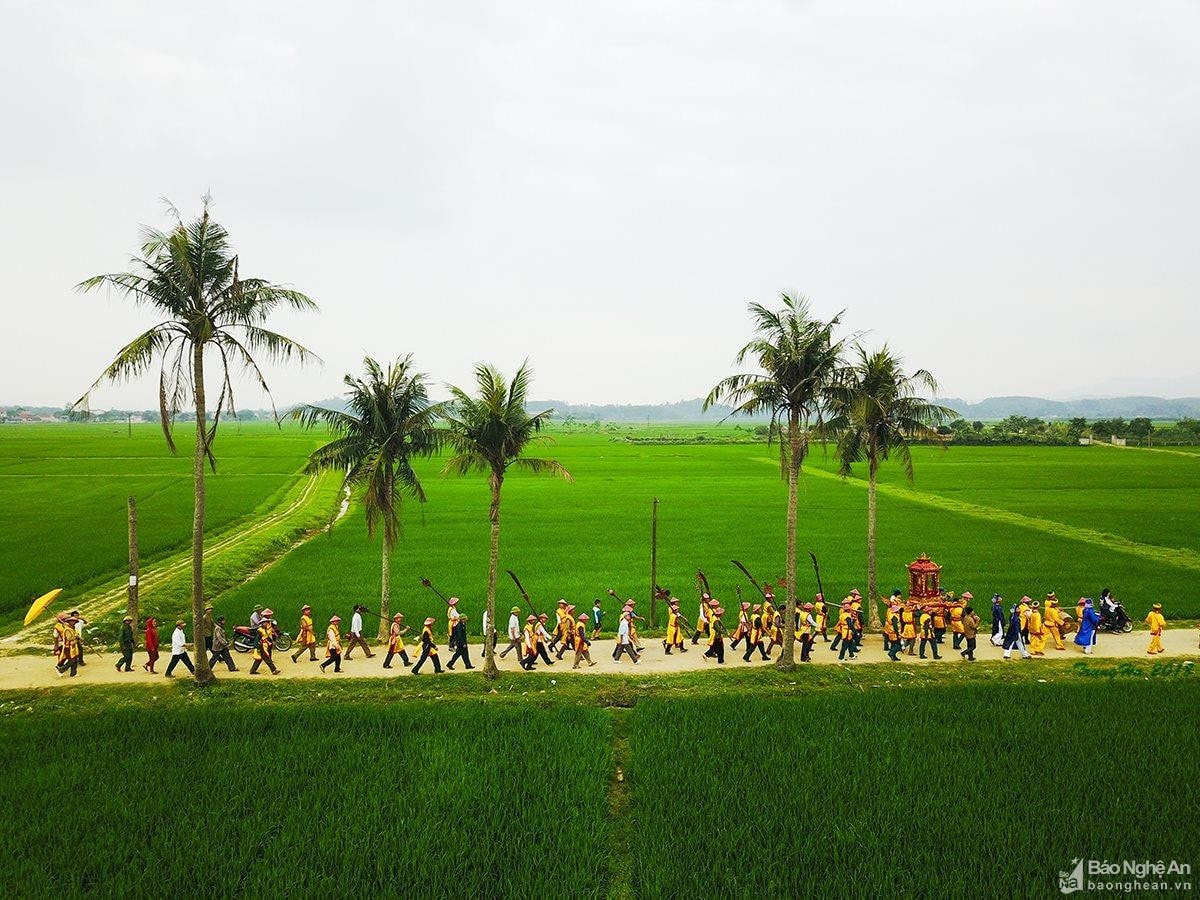
Exciting village festival in Nghe An. Photo: Trung Ha
Longwy is a region recognized as a world heritage site for its fortresses designed by Vauban. Longwy is located in the Lorraine region near the border with Belgium, known as the homeland of the impressively colorful “Cloisonné” ceramic vases. Nhan’s family has 4 members, a Belgian husband named Soblet Dominique, a very interesting person, 2 children, a girl and a boy. The girl’s name is Ngoc Anh Océane, 11 years old that year. The boy’s name is Ngoc Bao Kylian, 9 years old that year. What surprised and touched me was that Nhan’s 2 children could speak Vietnamese with a Thanh Chuong accent quite well, especially Ngoc Anh. When I heard Nhan say to Ngoc Bao: “Why are you so lazy to speak Vietnamese? If you don’t learn from me and don’t speak Vietnamese much, I won’t let you go visit your grandmother and aunt, do you hear?”, I felt like my homeland was so close even though I was in a remote part of France.
The memories of that trip were wonderful and warm. It is known that Nhan's Belgian husband is very thoughtful. Except for the Covid-19 pandemic, every year he brought his wife and children to his wife's hometown in Dong Van commune, Thanh Chuong district for a month or a few months. After getting to know each other, in 2018 and 2019, when returning to Nghe An, Nhan's whole family stopped by my house in Hanoi for a few days before returning to their hometown. I still have a clip of Nhan's niece speaking Nghe dialect to me at my house in Hanoi. When I asked, "Do you like going to Dong Van?" she answered "yes"; I asked, "Why do you like going to Dong Van?", she answered, "Because there is your grandmother and aunt."
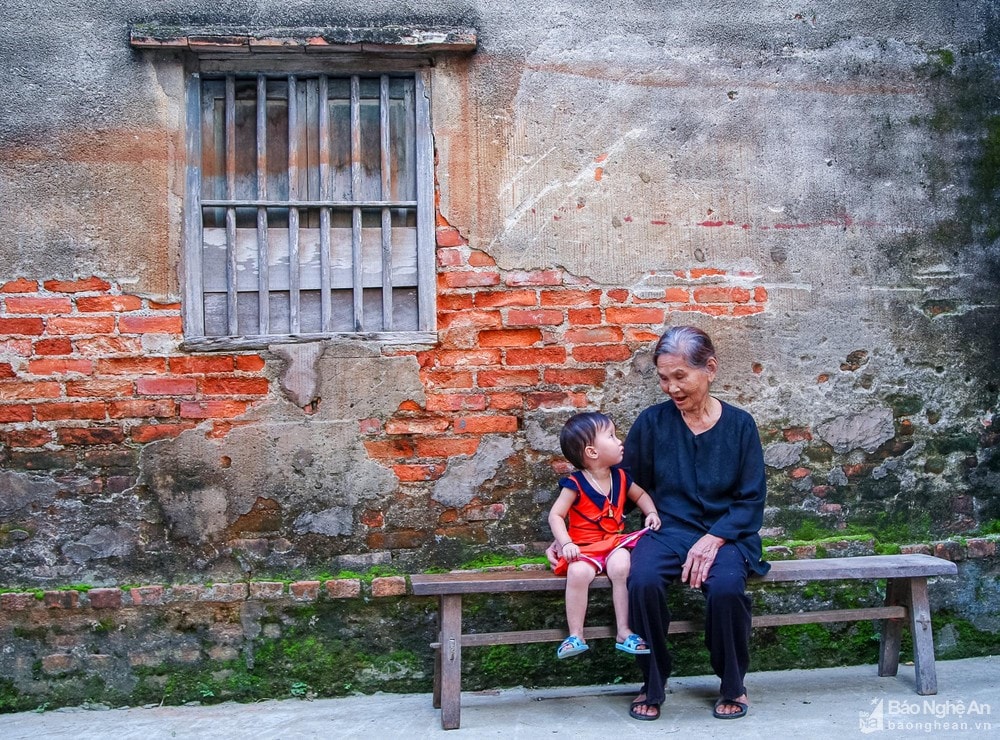
Grandmother and grandchild. Photo: Quoc Dan
In 2020, I went to Korea to teach Vietnamese for a year. One day, when I went to a meeting at the embassy, I happened to meet a guy who was also a representative of the Vietnamese side of the ASEAN Economic Community in Seoul. Hearing his Nghe accent, we immediately "hit the wave" and we often gathered at Thang's house to drink and party on the weekends because Thang's house was very large and beautiful. When I returned to Hanoi, one day I contacted Thang to invite him to drink draft beer at a restaurant in Bach Mai. When Thang arrived by motorbike, he brought his mother from the countryside to visit. Thang said, "Take your mother with you for fun." I was very touched. She just sat there, smiling happily, eating a few peanuts.
I tell these memories to show that, for Nghe An people, when they are far from home, it is like a first emotional signal that shortens the normal social distance, helping to quickly connect fellow countrymen far from home with each other. Perhaps that is why musician Le Xuan Hoa set to music a poem by poet Luong Khac Thanh that is truly Nghe and has a very suggestive and affectionate title, "Nghe Voice Comes Back". Of course, saying that does not mean that fellow countrymen from other regions are not attached. But in fact, it seems that Nghe An people often do everything to the end, maybe a little more than other regions, so they are nicknamed "crazy" and "extreme". Well, sometimes too much of anything is somewhat limited. The important thing is that people who go far away keep their hometown's identity, are attached and cozy with each other, but do not let it become cliques, regional discrimination, and then become "local".
In terms of language, historical linguists consider Nghe language a valuable source of data to support the study of the movement and development of Vietnamese. Nghe language still retains many "sediments" of ancient Vietnamese, ancient pre-Viet Muong language, even the period when pre-Viet Muong language had not yet separated from Mon - Khmer languages.
When I was in Cambodia, I discovered Khmer words that have the same origin as Nghe, such as Khmer:nis, Nghe dialect:ni, Vietnamese:This; Khmer:today, Nghe dialect:right, Vietnamese:day; Khmer:ch'ngai, Nghe dialect:sleepy, Vietnamese:distant; Khmerch'hô, Nghe dialectstandbut related to the wordsmall market(squat, that is, the typesitting and standing), Vietnamese:stand. The person who discovered the wordch'hôhas a meaning related to the elementsmall marketinsit and chatof Nghe dialect is scholar Phan Ngoc, also a Nghe native. In a meeting with him in 1985 when I returned to Hanoi, he was extremely pleased to show me about his discovery of the typesit and chatin my Nghe dialect it means sitting and standing immediatelysquat, notsit on the flooris related to the wordch'hôin Khmer. He said while laughing and slapping his thigh because of this discovery. He told me: “I like to tell you this story because you know Nghe dialect. The soldiers here, when they talk about this, they don’t understand so they don’t like to listen.”
Especially in terms of intonation, I hear and see many sentences that have similarities between Nghe An intonation and Khmer intonation. Perhaps thanks to that, I learned to speak Khmer very easily and when I speak Khmer, many Cambodians commented that I spoke like a native.
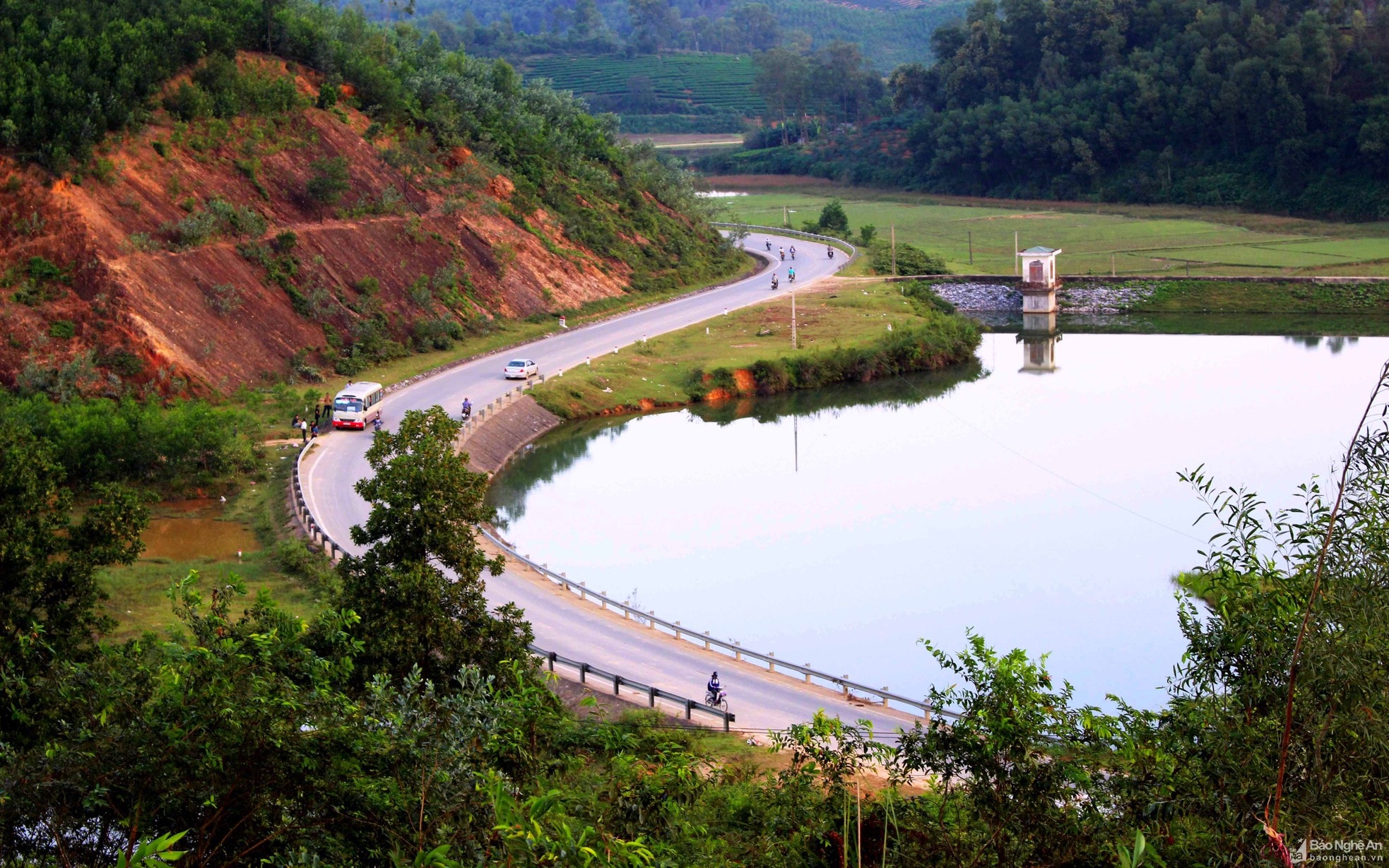
The winding road along Dong Danh irrigation lake in Thanh Thuy commune is one of the most beautiful roads in Thanh Chuong district and Nghe An province. Photo: Huy Thu
Nghe An language (Nghe An accent) is a precious heritage passed down from ancient times. Over time, there are sediments of ancient Vietnamese that still remain, but there are also changes in vocabulary. For example, ancient Nghe people called:bearand now calledrice, old callthe geese, Alreadyspider, now many areas are still calledspider, some areas are calledDaughteras common language.
Most of the Nghe people living far from home that I have met have a talent for changing their accents. For example, editor Diep Chi, Quang Vinh, MC Khanh Vy (whose accent changes from North to North, from South to South, from Nghe to Nghe); some have changed their accents a little, mainly Nghe, but still have the accent of the region where Nghe people settled (North/South), and there are some people who, no matter where they go, still do not change their accent/cannot change their accent, only use common words. I have a biological aunt (from Thanh Chuong), now both she and her uncle have passed away. Even though she followed my uncle (from Do Luong) everywhere, and then settled in Hanoi after 1954, more than 60 years away from home, my aunt still keeps her Nghe accent and old Nghe words. I remember one day I came to my aunt's house on Tran Hung Dao, when she saw me coming in, her cat kept jumping up and down in a panic. My aunt said:I'm sorry(it's just a joke).Oh the wordstains, I haven't heard it for decades but strangely, my childhood keeps flooding back in my memory with the wordstainsthat my mom said.
In conclusion, in the heart of every Nghe person far from home, there seems to be a deep longing for their homeland with many old stories. That is the old ferry dock that is still awake even though it now only exists in memory, the vi tune, the moonlit night song on the village dike and the boatmen rowing along the Lam River, now also a thing of the past. And when a Nghe person far from home meets a fellow countryman, they immediately change their tone of voice like "Where are you from?", then all the distance of formalities is shortened miraculously.
That's right:
Hear a familiar voice among the crowd of strangers
A handshake sir?
The rich and deep accent of our homeland
My hometown's voice is simple but lovely.
The sound of homeland returns in memories
Once we have met, it is easy to get to know each other.
Love each other and find the two words "fellow countrymen"...
(Lyrics of the song "The Voice of the Artist Comes Back").

